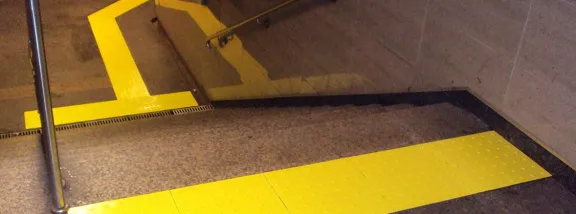Have you heard about podotactile pavement before? Even if you haven’t, we’re certain that you’ve seen it hundreds of times, maybe even in the same day. It’s just that in the moment we’re not conscious of the importance of certain things that we come across
To get to know the features of podotactile pavement better it’s necessary to be conscientious of its importance and uses. Do you want to find out more? Let’s go!
What is podotactile pavement?
Podotactile pavement is something that facilitates transit of people with reduced vision or complete vision loss. Through its installation in the ground it can indicate important factors such as which path to follow, unevenness in the ground, the beginning of stairs or a fork in the road
As you can see, importance to this product should be given. The features of podotactile pavements will be suitable for the needs of the visually impaired. Now, where are these types of flooring installed?
Where is podotactile pavement used?
Surely you’ve noticed that sidewalks of cities have certain points where podotactile pavement is used, like in the border of the sidewalk that indicates its end and the beginning of the road
Anyway, this is another type of site that uses this type of podotactile floor with the goal of guiding and preventing accidents. It’s typically used in spaces related to transport such as metro, train or bus stations as well as airports. It’s also typically found in public places such as hospitals and universities
On the other end, more and more service industry owners worried about accessibility are installing podotactile pavement in hotels, restaurants and coffee shops in order to facilitate accessibility and comfort for thousands of people
Characteristics of Sumigran’s podotactile pavement
Now that you are familiar with the importance and use of this type of pavement it’s time to discover the most important features that allow Sumigran’s podotactile floor to be functional yet evolving. In addition, you’ll have a reference for these types of installations
Tactile and Visual contrast
The fundamental characteristics of these podotactile tiles is that they have to have easily identifiable tactile contrast in order to assure safe transit of people with reduced visibility. The patterns are distinct in order to mark which direction the path is, the start of a change of height like stairs or a platform, or plaques that indicate forks in the road
In the same fashion, podotactile pavement has to have a high visual contrast in order to differenciate from the rest of the floor, this helps people who don’t have complete vision loss
Adaptable Material
In this way, the modular fabrication of podotactile pavements is made to be easily adaptable to whatever type of medium. The installation will align with any type of surface, such as the beginning of stairs, escalators, and foyers
In addition, the production material is made to be anti-slip, which will provide safe transit even in wet conditions. Whether it’s in the street on a rainy day or inside, the material can shed off any type of liquid
Complies with safety norms
Our podotactile pavement fulfills even the most strict safety regulation, like to give an example, fire resistance. It is also free of halogens and in case of combustion it has a low smoke emission in addition to low opacity and toxicity
At Sumigran, to assure ourselves our podotactile pavements comply with the most suitable designs, we take the most modern regulations of each country into account and with the counsel of expert organizations. In this way, organizations like the Once Foundation or the Royal National Institute for the Bling (Great Britain) approve of our quality and count on our products for jobs as important as the London and Madrid metros
Fast installation
Our podotactile pavements are easy to install and don’t need work. They are installed directly over the surface, without the need to lift up the floor. This is done not only to avoid the bothers of construction but for a drastic reduction in time and cost as well
Once installed, you can walk over the pavement just a few hours after. This is done to not disrupt the area of transit for pedestrians and to avoid long term zone closings
If you want to have an accessible space for those with impaired visibility or f you need another type of installation, you can find just what you’re looking for in our pavements at sumigran.es page. Don’t wait any longer!
Comments are closed.

